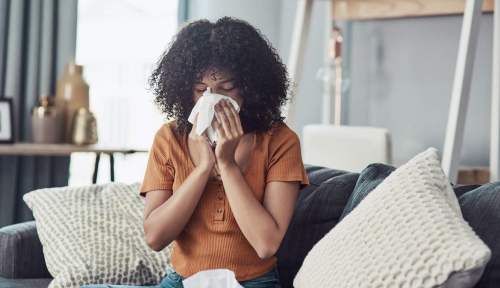Can Spring Allergies Impact Digestion? Gastroenterologists Weigh In.
Spring allergies just got worse—but you can avoid them (somewhat). Here doctors explain how and what to do.

While spring means warmer weather and breathable outfits, it can also mean constant sneezing, watery eyes, and blowing your nose every 10 minutes. In short, spring allergies are annoying. So, if you already agree with that sentiment, here’s another no-too-fun fact: Spring allergies can also negatively affect your gut.
Experts in This Article
Dr. Madathupalayam Madhankumar is a surgical gastroenterologist with iCliniq.
chief gastroenterologist at Mohawk Valley Endoscopy Center
Shaili Gandhi, Pharm.D., is the vice president of formulary operations at SingleCare.
A 2007 study published in BMJ Postgraduate Medical Journal looked at 7,235 adults and found that gastrointestinal symptoms are more common in patients with allergies. Additional research shows improving your gut microbiome is correlated with fewer allergy symptoms, and other studies show prebiotic fiber can decrease those symptoms as well. Undoubtedly, there’s a connection between the two.
“The digestive disorder is the lesser-known symptom of seasonal allergies,” says Madathupalayam Madhankumar, MD, a surgical gastroenterologist with iCliniq. He explains when histamines (the substance that causes allergy symptoms) are released into the gastrointestinal (GI) tract, they can cause symptoms such as bloating, stomach pain, nausea, diarrhea, and constipation.
Spring allergens can also exacerbate digestive problems you already have. “Hyperactivation of the immune system by allergens has led [to] the worsening of many common digestive diseases, such as irritable bowel syndrome, inflammatory bowel disease, celiac disease, leaky gut syndrome, eosinophilic esophagitis, and gastritis,” says Harvey Hamilton Allen Jr., MD, a medical director and physician who’s board-certified in internal medicine and gastroenterology.
What can help you avoid or handle those symptoms
Pay attention to what you eat
The foods you consume play a significant role in your symptoms, Dr. Allen says. He recommends watching out for any food items that exacerbate your symptoms. He also adds while foods such as yogurt, Kombucha, and sauerkraut are good for your digestive flora, they do contain histamines (so you should probably avoid them for now).
As far as helpful things to eat, Dr. Allen encourages cabbage, kale, Brussels sprouts, cauliflower, broccoli, anti-inflammatory spices (such as thyme and turmeric), organic foods, berries, fibrous foods, and fish oil. He also mentions the importance of staying hydrated.
Check pollen counts before heading outdoors
When and how often you go outside is also key. “Avoid going outdoors when pollen counts are more,” says Dr. Madhankumar.
Websites where you get your local weather (as well as Pollen.com) can help, says Shaili Gandi, PharmD. the vice president of pharmacy at SingleCare. “If you can’t avoid the outdoors in the morning, which is typically the highest for pollen counts, try wearing a mask or using a scarf to cover your nose and mouth,” she adds. “You can also wear glasses to try and keep the pollen from your eyes.”
Consider buying an air filter
Consider buying a product to make your home more comfortable, too. “Prevent allergens from infiltrating your home and invest in HEPA filters,” Dr. Gandhi says. She explains that high-efficiency particulate air filters remove small harmful allergens like dust, pollen, mold, and bacteria from the air.
Dr. Madhankumar also recommends cleaning your home frequently, especially of allergens like pollen (that can get on your clothes when you’re outside) and dust.
Talk to your doctor about medication
And of course, talking with your physician or allergist is almost always a good idea. Dr. Allen suggests asking about non-sedating antihistamine therapy.
You can also take an over-the-counter medicine such as Zyrtec or Claritin—after checking with a medical provider. “You should always check with your doctor or pharmacist as there are several different kinds of allergy medications,” Dr. Gandhi says. “These medications span from those that offer symptomatic relief to those that are more whole-body allergy medications, which might have a reaction to other medications.”
While the spring season can be a pain (literally), addressing your allergies in these ways can help prevent gut issues (and vice versa).
Oh hi! You look like someone who loves free workouts, discounts for cutting-edge wellness brands, and exclusive Well+Good content. Sign up for Well+, our online community of wellness insiders, and unlock your rewards instantly.
Sign Up for Our Daily Newsletter
Get all the latest in wellness, trends, food, fitness, beauty, and more delivered right to your inbox.
Got it, you've been added to our email list.










